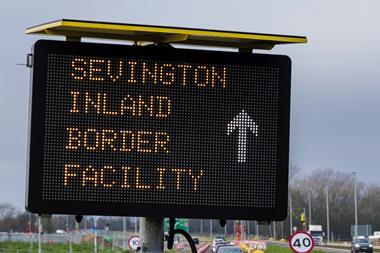An attempt by the government to establish a national traceability system for cattle could yield cost benefits for beef processors and retailers, although perhaps it risks blemishing the industry's image in the eyes of domestic consumers and potential export customers.
Contrary to the impression given by innumerable official statements since Britain began seriously trying to regain Brussels' permission to export beef after the BSE crisis, this country is far behind most other EU states in developing procedures for identifying and tracing livestock along the marketing chain.
Greece and Portugal are the only states apart from the UK not to have implemented an EU directive requiring a national traceability system to be in place since the beginning of this year (though the lack of it is in Great Britain; Northern Ireland has a sophisticted system).
The Cattle Movement Service, launched in a blaze of publicity a couple of years ago, has so far recorded far fewer than half the stock in the national herd. This does not mean the unrecorded cattle are unidentified. Most on the farms are believed to have the legally necessary documentation or tags.
However, because about 60% are unknown to the CMS computers, there is no cohesive national system accessible by processors or auctioneers. One consequence is a limited, fragmented resource base for major retailers needing traceable supplies.
Within the next few days MAFF will start trying to fill the holes in the database, posting forms to producers with a request for details of cattle on their holdings. But the farmers will not be under a legal obligation to comply.
{{MEAT }}
Close menu
- Home
- Retail & Wholesale
-
Products & Suppliers
- Back to parent navigation item
- Products & Suppliers
-
Product Categories:
- Back to parent navigation item
- Product Categories:
- Alcoholic drinks
- Bakery
- Cereals & breakfast
- Cheese
- Chicken & poultry
- Chocolate
- Confectionery
- Crisps, nuts & snacks
- Dairy
- Fish
- Fresh produce
- Frozen
- Household
- Meat
- Own Label
- Sauces & condiments
- Seasonal
- Soft drinks
- Vaping
- Vegan & plant-based
- World foods
- Suppliers
- People
- Reports & Data
-
Topics A-Z
- Back to parent navigation item
- Topics A-Z
-
Popular topics:
- Back to parent navigation item
- Popular topics:
- Cost of living crisis
- Crime
- Deposit Return Schemes
- Finance
- Government & Regulation
- Health
- Inflation
- Loyalty
- Marketing
- Mergers & Acquisitions
- New Product Development
- Sourcing
- Supply chain
- Sustainability & environment
- Technology
- Ultra Processed Foods
- Vaping
- A-Z all topics
- Content by type:
- Events
- Ask iA (beta)
- Subscribe now
Sign in to comment on this article
Not logged in before? Register for FREE guest access today.
You will be able to:
- Read more stories
- Receive daily newsletters
- Comment on stories
Advert
Related articles
-

-

10 charts that explain UK attitudes to food provenance
Paid for and in partnership with Cymru Wales
-














No comments yet